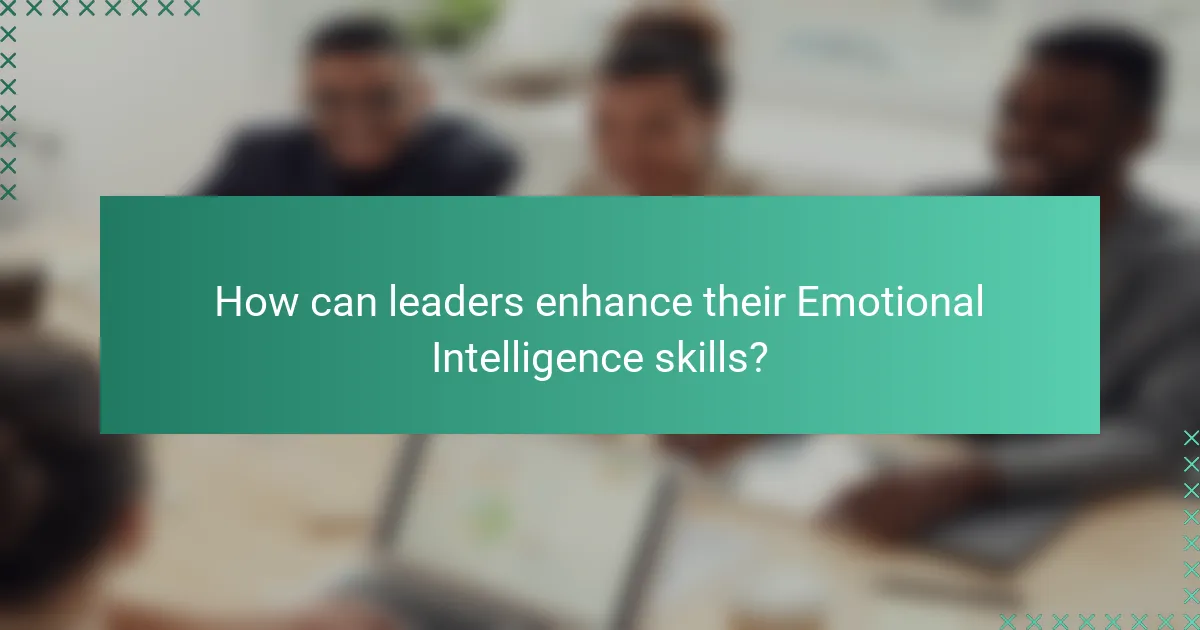Emotional intelligence in business leadership is defined as the ability to recognize, understand, and manage one’s own emotions, as well as the emotions of others. This skill is essential for effective leadership, as it enhances communication, conflict resolution, and team dynamics, ultimately leading to improved employee satisfaction and performance. Research indicates that leaders with high emotional intelligence can foster a supportive work environment, reduce employee turnover, and strengthen team relationships. Techniques for enhancing emotional intelligence include developing self-awareness, practicing empathy, and engaging in active listening, which collectively contribute to better team dynamics and overall organizational success.

What is Emotional Intelligence in Business Leadership?
Emotional intelligence in business leadership refers to the ability to recognize, understand, and manage one’s own emotions and the emotions of others. This skill is crucial for effective leadership as it enhances communication, conflict resolution, and team dynamics. Leaders with high emotional intelligence can empathize with their team members, fostering a supportive work environment. Research indicates that emotionally intelligent leaders can improve employee satisfaction and performance. A study by the Consortium for Research on Emotional Intelligence in Organizations found that emotional intelligence is a key predictor of leadership success.
How does Emotional Intelligence influence leadership effectiveness?
Emotional Intelligence (EI) significantly enhances leadership effectiveness. Leaders with high EI can recognize and manage their own emotions and those of others. This skill fosters better communication and collaboration within teams. Research indicates that leaders with high EI are more adept at conflict resolution. They create a positive work environment, leading to increased employee satisfaction. A study by Goleman (1998) found that EI is a stronger predictor of success than traditional intelligence in leadership roles. This correlation underscores the importance of EI in driving organizational performance and team cohesion.
What are the key components of Emotional Intelligence?
The key components of Emotional Intelligence are self-awareness, self-regulation, motivation, empathy, and social skills. Self-awareness involves recognizing one’s emotions and their impact on thoughts and behavior. Self-regulation refers to managing emotions in healthy ways, controlling impulses, and adapting to change. Motivation encompasses the drive to pursue goals with energy and persistence. Empathy is the ability to understand and share the feelings of others, fostering strong interpersonal relationships. Social skills involve managing relationships to inspire and influence others effectively. These components collectively enhance personal and professional interactions, leading to better leadership outcomes.
How do these components manifest in business leadership?
Emotional intelligence components manifest in business leadership through self-awareness, self-regulation, motivation, empathy, and social skills. Self-awareness allows leaders to recognize their emotions and their impact on others. This understanding fosters better decision-making and enhances interpersonal relationships. Self-regulation enables leaders to manage their emotions, leading to more effective stress management and conflict resolution. Motivation drives leaders to pursue goals with energy and persistence, inspiring their teams. Empathy helps leaders understand and address the needs of their employees, fostering a supportive work environment. Social skills facilitate effective communication and collaboration, essential for team dynamics and organizational success. Studies, such as those by Goleman, highlight that leaders with high emotional intelligence achieve better performance and employee satisfaction.
Why is Emotional Intelligence crucial for leaders?
Emotional Intelligence is crucial for leaders because it enhances their ability to manage emotions effectively. Leaders with high Emotional Intelligence can understand and empathize with their team members. This fosters a positive work environment and improves team collaboration. Research indicates that leaders with strong Emotional Intelligence can boost team performance by up to 30%. Additionally, these leaders are better at conflict resolution, which is vital in maintaining team harmony. They also inspire trust and loyalty among employees, leading to higher retention rates. Overall, Emotional Intelligence empowers leaders to navigate complex interpersonal dynamics successfully.
What impact does Emotional Intelligence have on team dynamics?
Emotional Intelligence (EI) significantly impacts team dynamics. High EI fosters better communication among team members. It enhances collaboration and promotes a positive work environment. Teams with high EI are more resilient to conflicts. Members can empathize with each other’s perspectives. This leads to improved problem-solving capabilities. Research indicates that teams with higher EI perform better overall. A study by Dr. Vanessa Urch Druskat and Dr. Steven B. Wolff found that emotionally intelligent teams are more effective in achieving goals.
How does Emotional Intelligence affect decision-making?
Emotional Intelligence (EI) significantly affects decision-making by enhancing self-awareness and empathy. Individuals with high EI can recognize their emotions and understand how they influence their decisions. This awareness helps in evaluating situations more objectively. EI also fosters better interpersonal relationships, which are crucial in collaborative decision-making environments. Research indicates that leaders with high EI make more informed choices, as they consider both emotional and rational factors. A study by Mayer, Salovey, and Caruso (2004) found that individuals with higher EI demonstrate superior problem-solving skills. This ability leads to more effective outcomes in business settings.

What are the benefits of Emotional Intelligence in Business Leadership?
Emotional intelligence in business leadership enhances decision-making and team collaboration. Leaders with high emotional intelligence can understand and manage their own emotions. They can also empathize with their team members. This fosters a positive work environment. Research shows that emotionally intelligent leaders can reduce employee turnover. They create stronger relationships within teams. According to a study by TalentSmart, 90% of top performers have high emotional intelligence. This leads to improved performance and productivity. Thus, emotional intelligence is crucial for effective leadership in business.
How does Emotional Intelligence enhance employee engagement?
Emotional Intelligence enhances employee engagement by fostering better communication and relationships among team members. It allows leaders to understand and manage their own emotions while also empathizing with others. This understanding leads to a supportive work environment. Employees feel valued and understood, which increases their motivation. Research indicates that organizations with high emotional intelligence report higher employee satisfaction. A study by the Harvard Business Review found that emotionally intelligent leaders can boost team performance by up to 30%. This correlation shows that emotional intelligence is crucial for cultivating an engaged workforce.
What are the measurable outcomes of increased engagement?
Increased engagement leads to measurable outcomes such as higher productivity and improved employee retention rates. Organizations with engaged employees can see productivity boosts of up to 20%. Enhanced engagement also correlates with a 25% reduction in employee turnover. Additionally, companies experience better customer satisfaction scores, often reflecting a 10% increase. Engaged teams are known to foster innovation, resulting in a 30% increase in creative solutions. Financial performance improves as well, with engaged organizations achieving 2.5 times higher revenue growth. These outcomes demonstrate the tangible benefits of fostering engagement within the workplace.
How can leaders foster a culture of engagement through Emotional Intelligence?
Leaders can foster a culture of engagement through Emotional Intelligence by actively promoting empathy and understanding within their teams. They should develop strong interpersonal relationships with team members. This involves recognizing and valuing individual emotions and perspectives. Leaders can also facilitate open communication, encouraging team members to express their thoughts and feelings. Regular feedback sessions can help build trust and transparency. Additionally, leaders can model emotional regulation, demonstrating how to manage stress and conflict effectively. Research shows that organizations with emotionally intelligent leaders report higher employee satisfaction and retention rates. These practices create a supportive environment that enhances overall engagement.
In what ways does Emotional Intelligence improve conflict resolution?
Emotional Intelligence enhances conflict resolution by promoting better understanding and communication. It allows individuals to recognize their emotions and those of others. This recognition leads to improved empathy during disagreements. Empathy facilitates active listening, which is crucial in resolving conflicts. Additionally, Emotional Intelligence helps in managing stress and emotions during disputes. This management prevents escalation and fosters a calm environment. Research shows that teams with higher Emotional Intelligence experience fewer conflicts. A study by the Consortium for Research on Emotional Intelligence in Organizations highlights that effective conflict resolution correlates with strong Emotional Intelligence skills.
What strategies can leaders use to manage conflicts effectively?
Leaders can manage conflicts effectively by employing several strategies. Active listening is crucial for understanding different perspectives. This involves giving full attention and acknowledging the concerns of all parties involved. Open communication fosters transparency and trust. Leaders should encourage team members to express their thoughts without fear of retribution. Mediation techniques can help facilitate discussions between conflicting parties. This approach allows leaders to guide the conversation towards a resolution. Setting clear expectations and boundaries is essential. It helps prevent misunderstandings that can lead to conflicts. Additionally, leaders should focus on collaborative problem-solving. This encourages teamwork and joint ownership of solutions. According to research by Goleman (1998), emotional intelligence significantly impacts conflict resolution abilities. The ability to empathize with others enhances a leader’s effectiveness in managing disputes.
How does Emotional Intelligence lead to better negotiation outcomes?
Emotional Intelligence (EI) enhances negotiation outcomes by improving interpersonal communication and understanding. EI allows negotiators to recognize and manage their own emotions and those of others. This awareness fosters empathy, which helps in building rapport with counterparts. Strong rapport can lead to more collaborative and less adversarial negotiations.
Additionally, individuals with high EI can regulate their emotions during high-stress situations. This regulation prevents impulsive decisions that may negatively impact negotiations. Research indicates that negotiators with high EI achieve better agreements and maintain longer-lasting relationships. A study published in the Journal of Organizational Behavior found that EI positively correlates with negotiation success.
Thus, EI contributes to better negotiation outcomes through enhanced communication, empathy, emotional regulation, and stronger relationships.

How can leaders enhance their Emotional Intelligence skills?
Leaders can enhance their Emotional Intelligence skills through self-awareness, empathy, and active listening. Self-awareness involves recognizing one’s emotions and their impact on others. Leaders can practice mindfulness to improve self-awareness. Empathy allows leaders to understand and share the feelings of their team. Practicing perspective-taking can enhance empathy. Active listening helps leaders respond effectively to team members. Techniques such as summarizing and asking clarifying questions improve active listening. Additionally, seeking feedback from peers can provide insights into emotional interactions. Research indicates that leaders with high Emotional Intelligence foster better team dynamics and performance.
What practical steps can leaders take to develop Emotional Intelligence?
Leaders can develop Emotional Intelligence through several practical steps. Firstly, they should practice self-awareness by reflecting on their emotions and behaviors. Regularly journaling can help in identifying emotional triggers. Secondly, leaders should seek feedback from peers and subordinates to gain insights into their emotional impact on others. Thirdly, engaging in active listening can enhance empathy, allowing leaders to understand team members’ perspectives better.
Additionally, leaders can participate in Emotional Intelligence training programs to learn strategies for managing emotions effectively. Role-playing scenarios can also provide practical experience in handling emotionally charged situations. Finally, cultivating a growth mindset encourages leaders to view challenges as opportunities for emotional development. Research shows that these practices can significantly improve leaders’ Emotional Intelligence, leading to better team dynamics and performance.
What role does self-awareness play in skill enhancement?
Self-awareness significantly contributes to skill enhancement. It allows individuals to recognize their strengths and weaknesses. This understanding helps in setting realistic goals for improvement. Self-aware individuals are more open to feedback. They can identify areas needing development. Research shows that self-awareness leads to better decision-making. A study by Tasha Eurich indicates that self-aware leaders are more effective. They inspire trust and motivate their teams. Thus, self-awareness plays a crucial role in enhancing skills effectively.
How can leaders practice empathy in their daily interactions?
Leaders can practice empathy in their daily interactions by actively listening to their team members. This involves giving full attention and acknowledging their feelings. Asking open-ended questions encourages team members to express themselves more freely. Leaders should also validate emotions, showing understanding and support. Sharing personal experiences can create a sense of connection and trust. Providing constructive feedback with compassion fosters a supportive environment. Regularly checking in with team members demonstrates care for their well-being. Research indicates that empathetic leadership improves team morale and productivity, enhancing overall workplace dynamics.
What resources are available for improving Emotional Intelligence?
Resources available for improving Emotional Intelligence include books, online courses, workshops, and coaching. Books such as “Emotional Intelligence 2.0” by Travis Bradberry offer practical strategies. Online platforms like Coursera provide courses on emotional intelligence. Workshops often focus on interactive learning and skill development. Coaching sessions can provide personalized feedback and guidance. Research indicates that training programs can significantly enhance emotional intelligence skills. According to a study published in the Journal of Organizational Behavior, participants in emotional intelligence training showed a 20% improvement in their EI competencies.
What types of training programs focus on Emotional Intelligence?
Types of training programs that focus on Emotional Intelligence include workshops, online courses, and coaching sessions. Workshops provide interactive experiences that enhance self-awareness and interpersonal skills. Online courses offer flexible learning options with structured content on emotional competencies. Coaching sessions deliver personalized guidance to develop emotional awareness in real-world situations. These programs often incorporate assessments to measure emotional intelligence levels before and after training. Research indicates that organizations investing in emotional intelligence training see improved team performance and employee satisfaction.
How can mentoring relationships support Emotional Intelligence development?
Mentoring relationships can significantly enhance Emotional Intelligence (EI) development. They provide a supportive environment for individuals to explore their emotions and social skills. Mentors often model effective emotional regulation and interpersonal skills. This modeling allows mentees to observe and learn from real-life examples. Additionally, mentors offer constructive feedback on emotional responses and behaviors. Such feedback helps mentees identify areas for improvement. Research indicates that mentorship programs can lead to increased EI scores among participants. A study by the International Journal of Evidence Based Coaching and Mentoring found that mentoring enhances self-awareness and empathy, key components of EI. Therefore, mentoring relationships are valuable for fostering Emotional Intelligence development.
What are some best practices for applying Emotional Intelligence in leadership?
Best practices for applying Emotional Intelligence in leadership include self-awareness, empathy, and effective communication. Self-awareness allows leaders to recognize their own emotions and how they affect their behavior. This recognition fosters better decision-making and enhances relationships with team members. Empathy enables leaders to understand the feelings and perspectives of others. This understanding builds trust and improves team dynamics. Effective communication involves clearly expressing thoughts and feelings while also being receptive to feedback. Studies show that leaders with high Emotional Intelligence can improve team performance by up to 30%. Additionally, fostering a positive work environment contributes to employee satisfaction and retention.
Emotional Intelligence in Business Leadership refers to the capability of leaders to recognize, understand, and manage their own emotions as well as those of their team members. The article outlines the significance of emotional intelligence in enhancing leadership effectiveness, improving team dynamics, and fostering a positive work environment. Key components such as self-awareness, self-regulation, motivation, empathy, and social skills are discussed, along with their impact on decision-making, conflict resolution, and employee engagement. Additionally, practical strategies for leaders to enhance their emotional intelligence skills and the measurable benefits of implementing these skills in a business context are highlighted.
